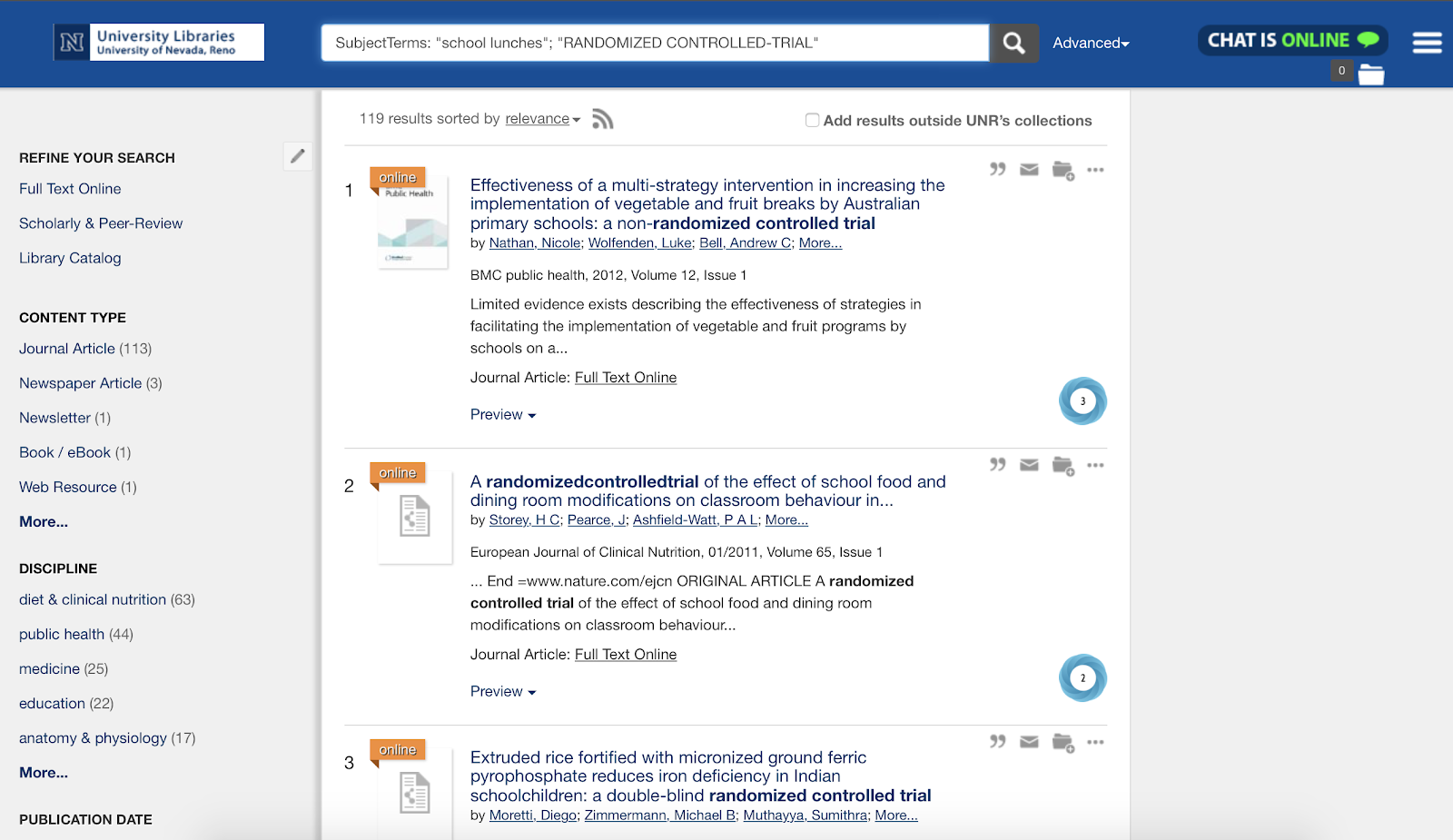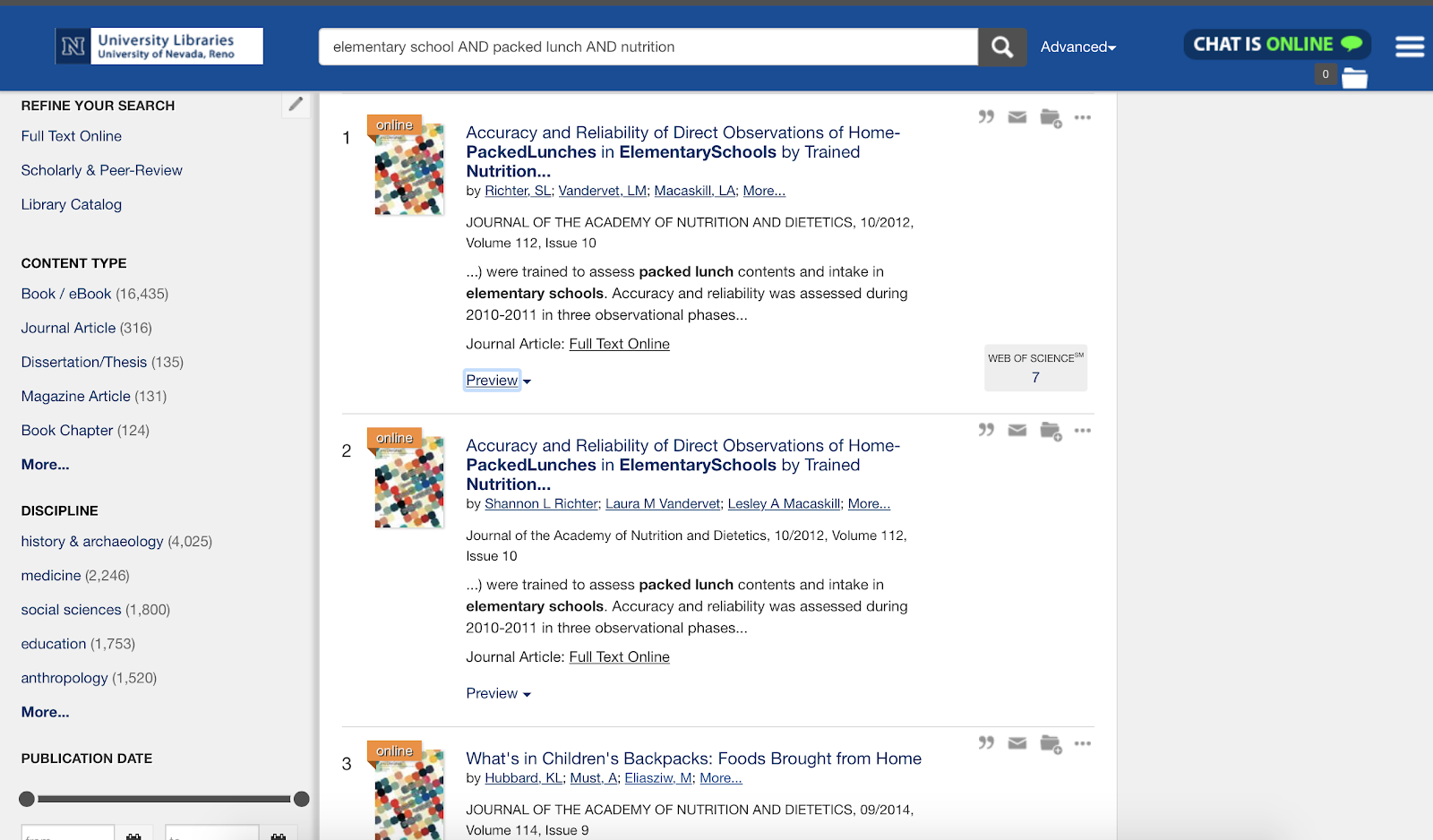What is your topic? Or what are your key words thus far?
- Validation
- Intake
- Questionnaire
- Self report
- RCT
What is your research question? Have you decided to change it at all? And, if you have, how do I know that the way in which this question is formulated is appropriate to conduct a literature review with a systematic approach?
My research question is: What is the difference in nutritional value of packed lunches vs. school prepared lunches?
I have modified my question a little bit. Instead of comparing school lunches in high income school districts versus low income school districts, I am just comparing the nutritional value of a packed lunch from home compared to the school lunches. A lot of people think that just because they are packing a lunch for their child or for themselves it is a lot healthier than the prepared foods that the school serves. I am very curious to see of this is the case and what the studies say behind this topic.
And what are the definitions on which it depends?
RCT: I am basically asking a question of, “what is the difference between x and y” and this method is used is a Randomized Controlled Trial; Scientific medical experiment to reduce bias
Questionnaire (Cross Sectional): Uses different groups of people who differ in the variable of interest but share other characteristics like socioeconomic status, educational background, and ethnicity to collect data.
Self Report: this method I most likely won't use much of because I am more interested in the scientific knowledge of this rather than someone doing their own report because they might be bias in a way that they think what they pack/eat is nutritious when it may not be the best
Validation: this is a method that will become useful as it has been some of the key words in my search results and in some of the articles.
What is your hierarchy of evidence? And how do I know you going about finding the most appropriate evidence/method for your research question?
I am still working with this part of the research, I have an idea what my hierarchy is but it still might change/ add more
- RCT
- Questionnaire (cross sectional)
- Direct observation
How do I know that the remit of the method itself is selecting the research, rather than just you on a whim? + 1 thing you found interesting + how you imagine using the source
I first started off of a very broad search to then narrow down my results with the subject terms. I wanted to just start off with what I knew about my topic and key words and with the RCT method. I started off by searching “Subject Terms: “school lunches”; “RANDOMIZED CONTROLLED-TRIAL” and had these results: 
Article #1: journal article, validation studies
Richter, S. L. (2012). Accuracy and reliability of direct observations of home-packed lunches in elementary schools by trained nutrition students. JOURNAL OF THE ACADEMY OF NUTRITION AND DIETETICS, 112(10), 1603-1607.
This article is directly related to my topic of nutritional value in school lunches. In the preview of this article it states, “Dietary assessment of home-packed lunches is challenging compared with assessment of standardized school meals due to greater diversity of items, nonstandard portions, and opaque containers.” Just from reading through this and looking through the article, I already know this will be useful. Some of the subjects I also found to be very useful when searching for subject terms. From here I clicked on the term ‘Questionnaire’ which led me to my next article. When searching different subject terms, more specific articles come up. Some of the other subjects that were helpful to search were, dietary intake, nutrition and dietetics, consumption, and dietary intake. I have added these terms to my subject terms to narrow down my results. This is a screenshot of the search I used and the first article that shows up is the one I am talking about that are related to my topic which is super helpful. When I clicked preview, it gave me all the subject terms that were super helpful to specify more articles. 
Article #2: Article, journal article, multicenter study
Hubbard, K. L. (2014). What's in children's backpacks: foods brought from home. Journal of the Academy of Nutrition and Dietetics, 114(9), 1424.
This article is specifically about packed lunches and what they are consisted of. This is a cross sectional baseline of data that was taken from the GREEN project lunch study. This article gives me a lot of important information that will be useful in my literature review specifically about the packed lunches and what they consist of. They include a lot of statistics that have very good evidence about this certain topic. It breaks each food item down with the given statistic such as snacks, fruits, desserts, and beverages. This article is super helpful because it is very specific and even talks a little bit about food packing behavior which is something that I have never thought about. This is meaning the behavior in which is the reasoning of why people pack certain things in their lunches. I didn't find any more subject terms from this particular article, however, it does touch on the subject terms of packed lunches, variation, and perceptions. This is a screenshot of a part of the journal that was very interesting to me. They actually take pictures of samples of some of the students packed lunches and compare and evaluate them. They consider this to be a primary source of this journal which is very useful.
This was also very interesting in the way they evaluated the lunches, they assigned standards in which if the lunches met the standards, then it received a point. This is what the standards included:
From the references from this journal, I noticed a lot more key terms that helped me for my topic. Here in reference #20, it says “Nutritional comparison of packed and school-lunches” which is exactly what I am looking for. This is a very specific article that is definitely going to be a lot of help for me.
Anything else interesting happen?
I am going to continue to find more articles now that I have more of an idea of what subject terms to use and I will continue to also modify my research question as needed.
No comments:
Post a Comment